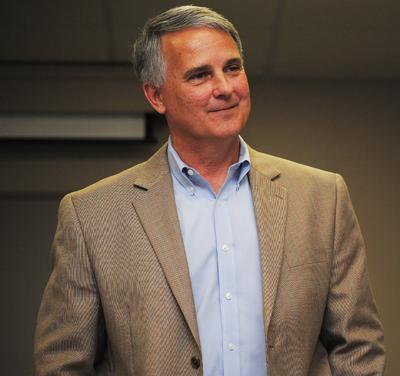
By Rob Mayer
We believe the greatest investment we can make is in the mind of a child, and our commitment to education is vital to strengthening Missouri’s future. This is why over the past session we worked to make sure we are giving our children access to a world-class education and given every opportunity to succeed. I am pleased that the governor has signed some of key measures we passed to give our children the best possible chance in life. This week, the governor signed Senate Bill 576, which creates new educational possibilities for Missouri students while adding new accountability standards for current charter schools. Charter schools provide an option for students in low-performing or unaccredited school districts. It is similar to a public school, receiving tax dollars for funding and open to all students in the districts where it operates, but a charter school is governed by an independent school board.
SB 576 brings both transparency and new accountability to current charter schools, as well as makes changes regarding where charter schools may operate. By affording any unaccredited district with the choice to start a charter school, rural districts now have the ability to give students options in improving their education. The act also creates the Missouri Charter Public School Commission, which may approve proposed charters for its sponsorship
I am also please the governor has signed the budget bills that fund education. In crafting the Fiscal Year 2013 budget, sent to the governor in early May, it was our priority to ensure core funding was intact for both the foundation formula for K-12 education, as well as funding for higher education.
This was not an easy task, as Missouri was faced with a tough budget. Yet, we believe that even in tough budget years, we should not cut education funding, protecting our students’ educational opportunities. This is why the Senate Appropriations Committee worked hard to find savings and efficiencies in state government, so that the budget we passed maintained level funding for K-12 education and restored proposed cuts by governor to higher education.
The budget sent to the governor showed the General Assembly continued its commitment to keep tuition affordable for Missouri students and their families. Unfortunately, in signing the budget bill, the governor last week asked our students to shoulder the burden of low revenue returns by making $8.48 million in withholds in funding to our state’s colleges and universities. It is our hope that the economy will improve so the governor can restore this withhold for our students’ future.
By making improvements and remaining committed to providing the funding and resources to our education system, we are giving our children every opportunity to succeed. There is still much progress to be made, but these small steps continue Missouri’s work towards providing each student with every opportunity to achieve their full potential.
Please feel free to contact me with your comments, questions, or issues on my website at www.senate.mo.gov/mayer.
Rob Mayer of Dexter represents the 25th Senatorial District in the Missouri State Senate and is the Senate President Pro Tem.
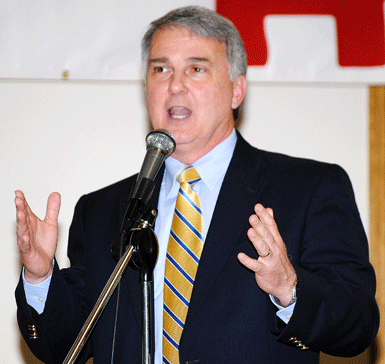
By Rob Mayer
Figures released last week by the U.S. Department of Commerce indicated that Missouri’s economy over the last year has been stuck in neutral with barely any growth. Lagging behind the national average is unacceptable and is why we have fought to grow Missouri’s economy by enacting policies that will put Missourians back to work in good-paying jobs. This past session we sent a number of bills to the governor to do just that, ending the failed policies of the past while removing the barriers which are preventing businesses from investing in new jobs.
An October 2011 Gallup poll showed small-business owners ranked compliance with government regulations as the most important problem facing them today. Few things can bring private sector growth to a halt more quickly than overly contrived red tape. This is why we worked hard to pass Senate Bill 469. If signed by the governor, it would require state agencies to review and reconsider regulations on a regular basis to increase agency accountability and improve legislative oversight. Each state regulation must be reviewed regularly to determine whether it is outdated, duplicative, conflicts with other rules, is burdensome or narrowly tailored; agencies must then make necessary changes while still providing adequate protection to the public.
As another part of our goal of improving Missouri’s business climate, we also quickly passed a bill making changes to Missouri’s workers’ compensation laws. Senate Bill 572 would have prevented co-employees from suing each other for unintentional work place accidents as well as make important changes regarding occupational diseases. The governor, however, disagreed with us and vetoed the bill. We did not give up though. The General Assembly knew failure to address co-employees liability was costing employers who had to maintain separate insurance for these lawsuits, money they could not invest in hiring new employees. Based on his veto message, the Senate amended House Bill 1540 to send a second version of workers’ compensation reforms to the governor for his signature.
Unfortunately, a third key fix we acted swiftly on to help businesses invest in jobs was also vetoed by the governor. The veto of House Bill 1219, which would have matched Missouri’s Employment Laws with that of the federal government’s, means employers are still burdened with expansive legal fees to navigate a current system riddled with uncertainty. We worked to remove the uncertainty so businesses could spend their money on employees and not lawsuits, but the veto prevented this change.
The General Assembly’s actions this past session were crucial in removing the burdensome regulations and barriers, making Missouri less competitive and with stifled job growth. Even with the small improvement in unemployment, there are far too many Missouri employees out of work, and that is why it was important we put these policies in place so Missourian can go back to work. I look forward to celebrating with workers across the state when the governor signs both HB 1540 and SB 469 in to law.
Please feel free to contact me with your comments, questions, or issues on my website at www.senate.mo.gov/mayer.Rob Mayer of Dexter represents the 25th Senatorial District in the Missouri State Senate and is the Senate President Pro Tem.
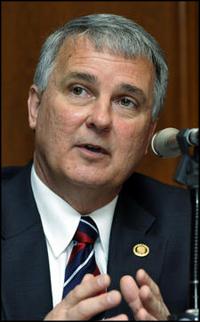
By Rob Mayer
More than 1,600 bills and joint resolutions were filed during the 2012 legislative session. Of those, 114 measures were passed by the General Assembly and have been sent to the governor, many of which still await his executive action. This past session, I sponsored and co-sponsored some of the measures that now lay on the governor's desk for his approval.
Legislation that requires certain funds received by sheriffs to be placed in a special fund in the county treasury is among those bills waiting the governor's stamp of approval. Currently, there is a special fund in each county treasury for certain funds coming into the possession of sheriffs that is to be used for each sheriff's office. However, land sale proceeds and regular budget allocations are not to be directed into the fund. In addition, the fund may not exceed $50,000. Any proceeds in excess of this amount go into the county treasury's general revenue fund. Senate Bill 834, which is contained in a larger judiciary measure (SB 628), specifies that charges received by sheriffs for executing service of process or other court orders must be placed in the special fund, subject to the $50,000 cap.
I also signed on to co-sponsor SB 812, a bill that establishes the Missouri Electric Prior Authorization Committee and pilot program. Substantially similar to HB 1827, which has been delivered to the governor for his signature, SB 812 creates a committee to facilitate, monitor and report to the General Assembly on Missouri-based efforts to contribute to the establishment of national electric prior authorization standards, which relates to the process of obtaining prior approval from an insurer for certain services or medications. Through a pilot program, the committee would study and disseminate information from the National Council on Prescription Drug Programs and advise the Legislature and the Department of Insurance, Financial Institutions and Professional Registration regarding the need for administrative rules for the department to advocate.
Finally, Senate Bill 754 designates a portion of Missouri Route 25 in Stoddard County as the "Spec. James Burnett, Jr. Memorial Highway." This legislation was combined with other similar legislation and ultimately passed in HB 1807, an omnibus transportation bill that designates several highways in the Show-Me State and creates several special license plates. Spec. Burnett died on Nov. 16, 2011, at the age of 21, in Kandahar Province, Afghanistan, when the Stryker vehicle he was riding in was struck by an IED. His father and stepmother live in Brownwood, Mo. It was a great privilege to carry this legislation through the Missouri Senate and ensure its rightful passage as it honors Spec. Burnett and several other heroes.
Also as part of upholding our commitment to the sacrifices of our veterans and their families, I pushed hard for the General Assembly to pass House Bill 1731 and House Bill 1680. HB 1731 ensured a permanent revenue stream is in place to fund our 7 veteran homes across the state, which serves the needs of our aging veterans. HB 1680 modifies the Show-Me Heroes Program so that Missouri has more tools available to prevent our military personnel and their families from falling into poverty while serving overseas. As a state we choose to honor the brave men and women who defend our freedoms by providing these important assistance programs our veterans and their families require.
To see a complete list of bills passed by the General Assembly this year and delivered to the governor, visit www.senate.mo.gov. Please feel free to contact me with your comments, questions, or issues at the contact information listed below and on my website at www.senate.mo.gov/mayer.
Rob Mayer of Dexter represents the 25th Senatorial District in the Missouri State Senate and is the Senate President Pro Tem.
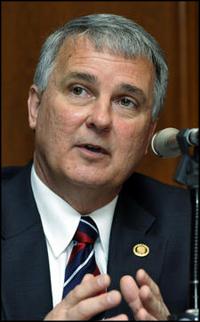
By Rob Mayer
Every student in Missouri should have access to a world-class education. This is why education remains one of our major priorities in the Senate. In order to prepare our students to enter the workforce and become an economic driver for our state, we must continue to make needed reforms that will provide for a quality education.
Last week the Senate gave overwhelming approval to Senate Bill 677, which helps students trapped in a failing school district. The measure cuts the waiting period between declaring a school district unaccredited and the Missouri State Board of Education taking over governance of the district.
If the bill is passed by the Legislature and signed into law, the Missouri State Board of Education would not have to wait to appoint a replacement board for a school district that fails to meet the standards to become accredited. By removing the two-year waiting period, there can be a quicker transition in beginning the process of regaining the district’s accreditation. The measure also gives power to the state board to set a specific length of time to reach improvement and become accredited or be kept under the state board’s supervision.
The Senate also advanced Senate Bill 576. Provisions in this bill made changes to charter schools creating new educational possibilities for Missouri students. Charter schools provide an option for students in low-performing or unaccredited school districts. It is similar to a public school, receiving tax dollars for funding and open to all students in the districts where it operates, but a charter school is governed by an independent school board. SB 576 brings both transparency and new accountability to current charter schools, as well as makes changes on where charter schools may operate. By affording any unaccredited district with the choice to start a charter school, rural districts now have the ability to give students options in improving their education.
As the legislative session progresses, there are still many actions in which we need to move forward, the first of which takes place this week as the Senate begins debate on Missouri’s $24 billion budget. Education funding is a key component in the decisions made in passing the final balanced budget. In the last few years, we have kept our commitment to education by making tough fiscal decisions, allowing us to pass balanced budgets that held the school funding formula level. This year we will do the same and prevent cuts to our K–12 schools.
We also will continue the broader discussion on fixing classrooms and putting our students first. This includes conversations on changing teacher tenure to ensure our students have good instructors in the classrooms and how to best provide resources to our school districts.
We know the greatest investment we can make is in the mind of a child. By making improvements and remaining committed to providing the funding and resources to our education system, we are giving our children every opportunity to succeed.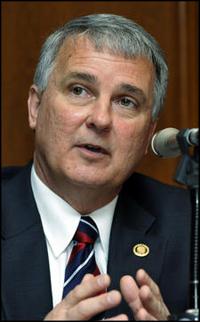
By Rob Mayer
Last year communities across our state experienced historic floods, resulting in many devastated Southeast Missouri homes, farms, and livelihoods. This unacceptable destruction is why I introduced, and the Senate overwhelming passed, Senate Concurrent Resolution 25.
In the wake of last year’s rising waters, the U.S. Army Corps of Engineers was forced to make unenviable decisions without full understanding of its consequences. One such decision was to release water from upstream along the Mississippi River. This caused pressure on river levees that protect our communities, businesses, and agriculture from water damage. The resulting levee breaks caused massive damage impacting the economic stability of our state. The Food and Agricultural Policy Research Institute of the University of Missouri found the economic loss, because of the flooding of crop lands, to be $60.6 million in Southeast Missouri alone.
This concurrent resolution encourages our representatives in the U.S. Congress and the Commanding General of the U.S. Army Corps of Engineers to develop a better plan to deal with severe flooding. It is vital for the Corps of Engineers to have a plan in place that eliminates, when possible, or otherwise minimizes damage to homes, farms, and businesses so further economic hardship is not handed to people across the state of Missouri.
Last year’s devastation cannot be repeated. Senate Concurrent Resolution 25 is one of the many ways we continue to press the U.S. Army Corps of Engineers to be better prepared for future flooding and natural disasters in our state.
Missouri’s natural disaster recovery is also one reason why it is a priority to move forward in making important changes to our prevailing wage laws. Many needed public projects across the state, especially in disaster areas like Joplin, are unaffordable because of our prevailing wage laws and are therefore being put on hold.
Currently in Missouri the prevailing wage is set by the Division of Labor Standards. The goal with prevailing wage is that it is supposed to use data on the wages paid for occupations in each county to set the rate contractors are paid on public works projects. Unfortunately, our current system does not work well, and wages are then artificially inflated, causing taxpayers to pay more than they should for public projects.
I have proposed in Senate Bill 439 that Missouri no longer use the Division of Labor Standards and the MODE method of statistical analysis in determining the prevailing wage. Instead, wages would be based on the federal Bureau of Labor Statistics data for each county. With this new system in place, we have the right balance between spending of taxpayer money responsibly and maintaining good wages for workers.
I expect the Senate to continue moving forward this week on this priority, as well as working on strengthening our educational system and passing a balanced budget.
Rob Mayer of Dexter represents the 25th Senatorial District in the Missouri State Senate and is the Senate President Pro Tem.

